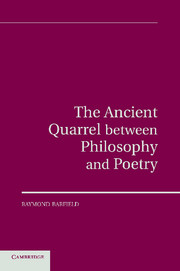Book contents
- Frontmatter
- Contents
- Acknowledgments
- Introduction
- 1 Socrates, Plato, and the Invention of the Ancient Quarrel
- 2 Aristotle, Poetry, and Ethics
- 3 Plotinus, Augustine, and Strange Sweetness
- 4 Boethius, Dionysius, and the Forms
- 5 Thomas and Some Thomists
- 6 Vico's New Science
- 7 Kant and His Students on the Genius of Nature
- 8 Hegel and the Owl of Minerva
- 9 Kierkegaard: A Poet, Alas
- 10 Dilthey: Poetry and the Escape from Metaphysics
- 11 Nietzsche, Heidegger, and the Saving Power of Poetry
- 12 Mikhail Bakhtin and Novelistic Consciousness
- Index
- References
9 - Kierkegaard: A Poet, Alas
Published online by Cambridge University Press: 03 May 2011
- Frontmatter
- Contents
- Acknowledgments
- Introduction
- 1 Socrates, Plato, and the Invention of the Ancient Quarrel
- 2 Aristotle, Poetry, and Ethics
- 3 Plotinus, Augustine, and Strange Sweetness
- 4 Boethius, Dionysius, and the Forms
- 5 Thomas and Some Thomists
- 6 Vico's New Science
- 7 Kant and His Students on the Genius of Nature
- 8 Hegel and the Owl of Minerva
- 9 Kierkegaard: A Poet, Alas
- 10 Dilthey: Poetry and the Escape from Metaphysics
- 11 Nietzsche, Heidegger, and the Saving Power of Poetry
- 12 Mikhail Bakhtin and Novelistic Consciousness
- Index
- References
Summary
“The poetic is glorious, the religious still more glorious, but what lies between is silly talk, no matter how much talent is wasted on it.” So says Frater Taciturnus, one important guide to thought about poetry and its relation to life, history, and philosophy. Taciturnus is one guide among many, for in the works of Kierkegaard the relationship of poetry to philosophy not only is a question examined and considered from many angles but is a quarrel and struggle enacted in the works themselves, written under pseudonyms by a writer who, on multiple occasions in his papers and journals claimed, “I'm a poet – alas, just a poet.” Kierkegaard did not write formal poems, but he wrote poetry understood in a certain sense: “The subject matter plays a very important role [in] … poetry, this word understood in its widest meaning to denote all artistic production that is based on language and the historical consciousness.” In relation to his characters, Kierkegaard explicitly requests his readers to remember, “My wish, my prayer, is that, if it might occur to anyone to quote a particular saying from the books, he would do me the favor to cite the name of the respective pseudonymous author.”
Poetry does a tremendous amount of work in Kierkegaard's presentation of his thought. And yet poetry used as a means of presenting certain perspectives and of bringing us to certain thresholds, fails – and for Kierkegaard fails most miserably – if it becomes something more than a means for realizing that poetry is not sufficient.
- Type
- Chapter
- Information
- The Ancient Quarrel Between Philosophy and Poetry , pp. 189 - 209Publisher: Cambridge University PressPrint publication year: 2011

